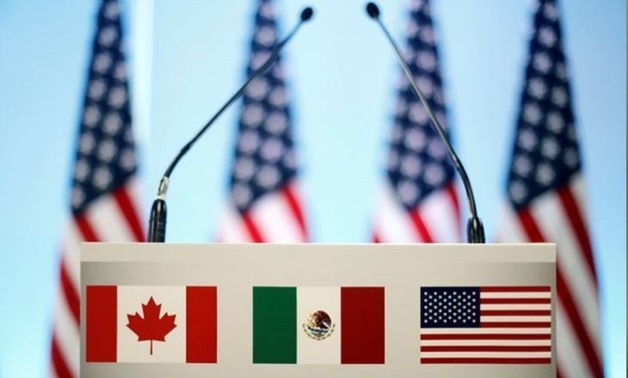Canada and U.S. Making Progress as NAFTA Nears Deadline

With time fast running out, Canadian and U.S. negotiators “made lots of progress” on Sunday on a renewed NAFTA but had still not settled tough issues such as American tariffs and access to Canada’s dairy market, an official and sources said
U.S. President Donald Trump’s administration has said Canada must sign on to the text of the updated North American Free Trade Agreement by midnight on Sunday (0400 GMT Monday) or face exclusion from the pact. Washington has already reached a side deal with Mexico, the third NAFTA member.
“We are close, but not there yet”
“Lots of progress but we’re not there yet … we still have a couple of tough issues, so we’re doing our best,” Canada’s ambassador to Washington, David MacNaughton, told reporters outside the Ottawa building where Canadian officials are gathered.
“I’m cautiously optimistic, but we’ll see,” he added.
Officials are talking continuously by telephone. One Ottawa source directly familiar with the talks said the two sides were very close, while another said: “We are close, but not there yet.”
The office of the U.S. Trade Representative told stakeholders over the weekend that Washington was on track to reach a deal with Ottawa by the end of Sunday, said people briefed on the matter.
Trump blames NAFTA for the loss of American manufacturing jobs and wants major changes to the pact, which underpins $1.2 trillion in annual trade. Markets fear its demise would cause major economic disruption.
One of the Canadian sources said Ottawa would take nothing for granted until Trump had signed off on a deal.
U.S. Trade Representative Robert Lighthizer and White House adviser Jared Kushner planned to brief Trump on Sunday on the talks, said a U.S. source familiar with the discussions.
As part of any agreement, Canada looks set to offer increased access to its highly protected dairy market, as it did in separate pacts with the European Union and Pacific nations.
The influential Dairy Farmers of Canada lobby group – which strongly opposes the idea – said in a statement that it insisted “any final NAFTA deal should have no further negative impact on the dairy sector.”
U.S. business groups oppose turning NAFTA into a bilateral deal because the three nations’ economies have become closely intertwined since the original pact came into force in 1994.
Officials have blown through several deadlines since the talks started in August 2017, and a third Canadian source said that if the two sides were close enough at midnight, negotiations could spill over into Monday.
TARIFF ISSUE
Canada and the United Stares are also looking for a compromise on the issue of U.S. tariffs.
Trump has already imposed tariffs on Canadian aluminum and steel, citing national security, and is threatening similar punitive measures against auto exports. Canadian Prime Minister Justin Trudeau said it made no sense to sign on to a new NAFTA only to be hit by new tariffs, and is seeking safeguards.
One source briefed on the talks said negotiators were looking to imitate the provisions of the bilateral Mexico-U.S. deal on NAFTA.
The two nations signed a side letter allowing Washington to pursue tariffs on annual Mexican car and SUV imports of over 2.4 million vehicles, a number that significantly exceeds last year’s total. The Mexican government said the letter provided insurance that gave the auto industry scope to grow.
A fourth Canadian source directly familiar with the negotiations said any suggestion Ottawa would accept a cap or quota on autos exports was completely inaccurate.
Reuters












